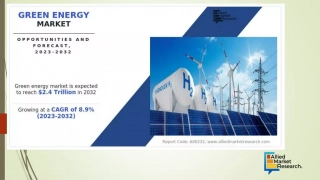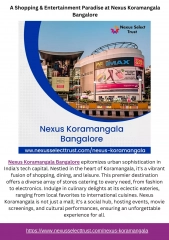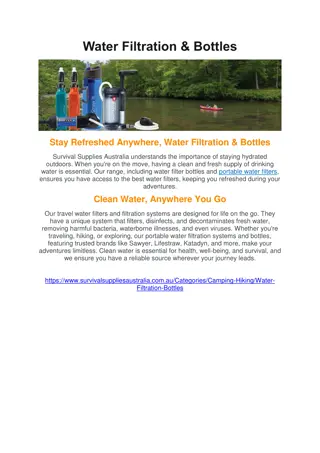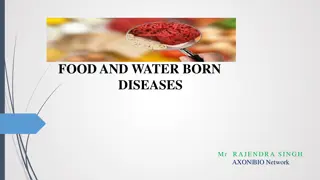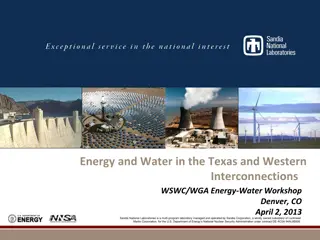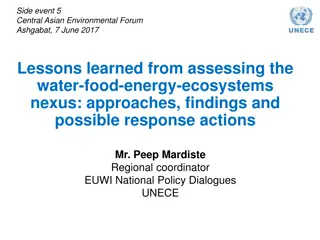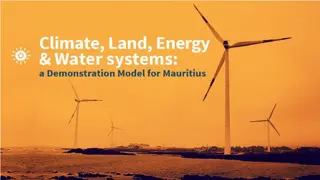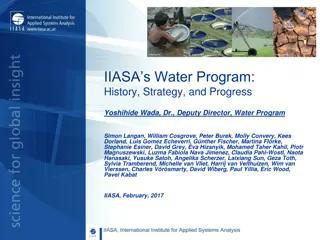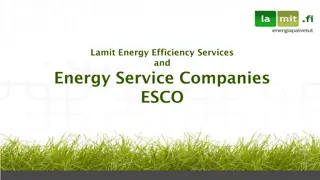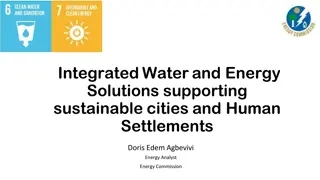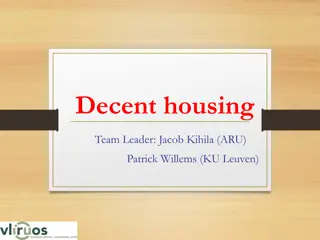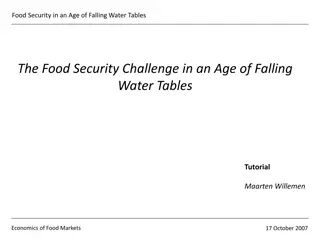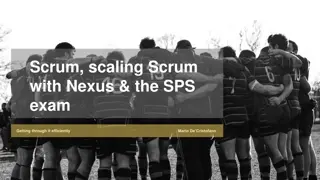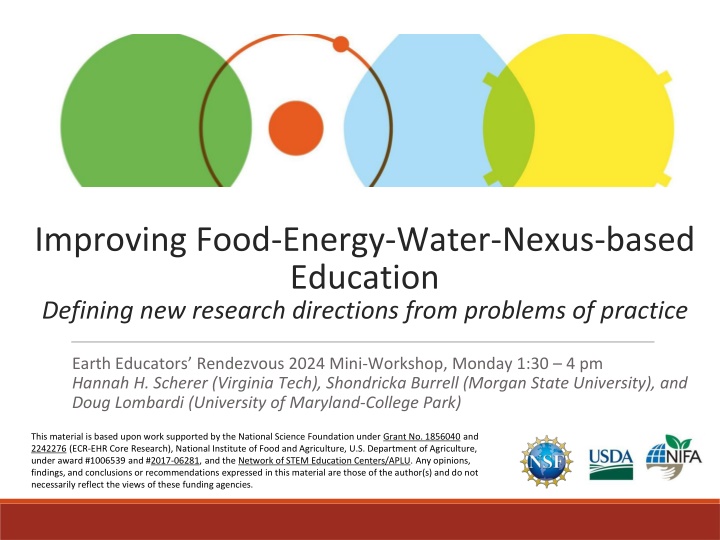
Enhancing Food-Energy-Water Nexus Education
National Collaborative for Research on Food, Energy, and Water Education aims to improve FEW-Nexus-based education by defining research directions. Explore challenges, strategies, and engagement with NC-FEW to generate new knowledge in geoscience education.
Download Presentation

Please find below an Image/Link to download the presentation.
The content on the website is provided AS IS for your information and personal use only. It may not be sold, licensed, or shared on other websites without obtaining consent from the author. If you encounter any issues during the download, it is possible that the publisher has removed the file from their server.
You are allowed to download the files provided on this website for personal or commercial use, subject to the condition that they are used lawfully. All files are the property of their respective owners.
The content on the website is provided AS IS for your information and personal use only. It may not be sold, licensed, or shared on other websites without obtaining consent from the author.
E N D
Presentation Transcript
Improving Food-Energy-Water-Nexus-based Education Defining new research directions from problems of practice Earth Educators Rendezvous 2024 Mini-Workshop, Monday 1:30 4 pm Hannah H. Scherer (Virginia Tech), Shondricka Burrell (Morgan State University), and Doug Lombardi (University of Maryland-College Park) This material is based upon work supported by the National Science Foundation under Grant No. 1856040 and 2242276 (ECR-EHR Core Research), National Institute of Food and Agriculture, U.S. Department of Agriculture, under award #1006539 and #2017-06281, and the Network of STEM Education Centers/APLU. Any opinions, findings, and conclusions or recommendations expressed in this material are those of the author(s) and do not necessarily reflect the views of these funding agencies.
National Collaborative for Research on Food, Energy, and Water Education (NC-FEW) A hub for people who are interested in expanding and improving FEW- Nexus-based education through research and/or practice
Agenda Overview Workshop objectives What is FEW-Nexus-based education? Challenges, solutions, and strategies How can you engage with NC-FEW?
Agenda Overview Workshop objectives
Workshop Objectives Define and describe FEW-Nexus-based education Identify and describe challenges with FEW-Nexus-based education Ideate ways in which geoscience education research can generate new knowledge to address these challenges
Agenda Overview What is FEW-Nexus-based education?
Major resource challenges are grounded in the Food-Energy-Water-Nexus (FEW-Nexus) Framework for natural systems and their human dimensions Food systems = coupled human- natural systems Energy systems Water systems
FEW-Nexus-based education is Assertion: The FEW- Nexus affords a novel theoretical and analytical lens through which to understand and effectively foster teaching and learning. Food systems Energy systems Water systems
FEW-Nexus-based education is happening in many educational contexts PK-12 classrooms across different subjects Informal educational environments, non-formal programs, communications Undergraduate and graduate programs
Small group discussion What does/could FEW-Nexus-based education look like in your context? How does the FEW-Nexus connect to what/how you already teach? What affordances does the FEW-Nexus provide in your educational context? Prepare to share out ideas from your group in 20 minutes
FEW-Nexus-based education is Defined by NC-FEW argumentation/evidence-based reasoning inherently inter-/trans-disciplinary citizen science complex systems thinking equity and environmental justice grounded in real-world sustainability challenges informed decision-making involves stakeholders STEM/FANH science literacy local to global scales civic engagement
Nexus perspective utilized in consideration of tradeoffs in solutions Centering decision making about management of natural resources Intentional integration of food, energy, and water systems Features in design and delivery of FEW- Nexus-based education for NC-FEW
Understanding how food, energy, and water decisions affect the thriving of local, regional, and global systems STEM Teaching Tools Practice Brief 96, NC-FEW PK-12 Working Group Affordances of FEW-Nexus approach for STEM education all components of interconnected systems (not isolated) local, regional, and global levels economic, social, environmental and ethical decision-making are entangled Strategy: problem scoping practices, e.g. causal-loop modeling consider the systemic interrelations of FEW see these interrelations as part of larger socioecological and sociotechnical systems imagine and design for just futures centered on a flourishing living world
Implementing Interdisciplinary Sustainability Education With the Food-Energy-Water Nexus Manuscript in Review, NC-FEW Higher Ed Working Group Affordances of FEW-Nexus approach for Higher Education a powerful way to to achieve sustainability competencies equips students to facilitate the transformation of the global society prepares graduates to meet targets set by the United Nations Sustainable Development Goals
Agenda Overview Challenges, solutions, and strategies
FEW-Nexus-based education is Broader contextual factors evolving to address challenges Limitations of educational structures Lack of resources and support Individual barriers
Gallery Walk: Overview of steps 1. Large Group: Ideate challenges Each challenge on chart paper around the room 1. As individuals, visit the posters, and add comments Consensus ideas around challenges 1. In groups of 2-3, revisit posters and add ideas for how to address challenges through research or practice Actionable steps for future work 1. As individuals, vote for the top 2 challenges Ranking of challenges to guide future work
Gallery Walk: Step 1 Large Group: Ideate challenges Each challenge on chart paper around the room What challenges are faced by educators to integrate FEW-Nexus concepts in their endeavors?
Gallery Walk: Step 2 Goal: Consensus ideas around challenges As individuals, visit the posters and add questions and/or comments to further clarify/refine the framing of the challenge.
Gallery Walk: Step 3 Goal: Actionable steps for future work In groups of 2-3, revisit posters and add ideas for how to address challenges through education research or practice
Gallery Walk: Step 4 Goal: Ranking of challenges to guide future work As individuals, vote for the top 2 challenges that you think education researchers should address to assist educators in integrating FEW-Nexus-based education in their work. Add ideas about how/why.
Idea sharing Broader contextual factors How do we overcome challenges with implementing FEW- Nexus-based education? Limitations of educational structures Lack of resources and support Individual barriers
Collaborative Community Science Data Talks (CSDTs) Project The project aim is to generate Community Science Data Talks (CSDTs) to be used in classrooms by local secondary math/science teachers. These place-based data sets will facilitate student learning of disciplinary content while examining issues of equity and justice in their communities through the lens of math and science. Food Math and Science Content Equity and Justice Energy Water Place-based inquiry
NC-FEW Resources Member Profiles: Individual NC-FEW members describe their work 2023 Invited Conference Poster Collection Virtual Workshop Series: Recordings, synthesis documents, additional resources
Agenda Overview How can you engage with NC-FEW?
NSF Research Coordination Network (RCN) - current funding Supports networks that foster communication and new collaborations among scientists, engineers and educators who share a common interest RCN awards also do not support primary research. Rather, the RCN program supports 1. the means by which investigators can share information and ideas, 2. coordinate ongoing or planned research activities, 3. foster synthesis and new collaborations, develop community standards, and 4. in other ways advance science and education through communication and sharing of ideas. Proposed networking activities directed to the RCN program should focus on a theme to give coherence to the collaboration, such as a broad research question or particular technologies or approaches. https://www.nsf.gov/pubs/2017/nsf17594/nsf17594.htm
Need for a collaborative to innovate education research Research to understand teaching and learning in the FEW-Nexus is emerging Few efforts to study strategies, processes, and outcomes of FEW- Nexus-based education efforts FEW-Nexus transcends disciplinary boundaries Recent efforts show promise National Collaborative for Research on Food, Energy, and Water Education NC-FEW
National Collaborative for Research on Food, Energy, and Water Education (NC-FEW) A hub for people who are interested in expanding and improving FEW- Nexus-based education through research and/or practice Goals moving forward: Identify and promote best practices in education research on educational programming grounded in the FEW-Nexus Foster collaboration among community members representing diverse disciplines, fields, expertise, and institutions Enhance capacity for extramural funding in support of education research on educational programming grounded in the FEW-Nexus Cultivate a community identity among NC-FEW participants
NC-FEW Leadership Team Postsecondary Working Group Leadership Team, Working Group Members, and Advisory Board are listed on our website at https://serc.carleton.edu/nc- few/people.html Working Group Chairs NC-FEW Director & co-Directors PK-12 Working Group Informal/ non-formal Working Group
NC-FEW Directors Dr. Hannah Scherer (PI/ Director) Agricultural, Leadership, and Community Education Virginia Tech Dr. Nicole Sintov (Co-PI/co-Director) Behavior, Decision Making and Sustainability The Ohio State University Dr. Hui-Hui Wang (Co-PI/co-Director) Agricultural Sciences Education and Communication Purdue University
NC-FEW Working Group Chairs Informal/non- formal education and communication Post-secondary Education PK-12 Education Dr. Anil Kumar Chaudhary Dr. Doug Lombardi Dr. Chelsie Romulo Department of Human Development and Quantitative Methodology Department of Geography, GIS, & Sustainability Department of Agricultural Economics, Sociology, and Education Northern Colorado University University of Maryland, College Park Penn State
NC-FEW Website: central hub Project website - https://serc.carleton.edu/nc-few/index.html Key Features NC-FEW information vision, mission, goals, and funding List of NC-FEW leadership team and working group members Events Past and future conference information Registration and logistics Workspace for participants Virtual Workshops and Newsletters Archive Registration for upcoming webinars Suggest topics/speakers Member Profiles
FEW-Nexus-based education research and practice training series Quarterly Web-based Virtual Workshop Series Supporting participants in advancing education research and educational programming grounded in the FEW-Nexus Emphasis on Design Based Research & Critical Research and Perspectives Theoretical and analytical perspectives and approaches Showcasing individual Nexus-focused educational programs/research Synthesis document and resources posted for each webinar
Newsletters Quarterly Highlighting information relevant to the community Showcasing work of NC-FEW community members Sharing information about relevant funding programs and conferences Discussing and soliciting feedback on ongoing efforts Community news and events
Invited Conferences Example activities Keynote speakers Interactive poster sessions Sharing and synthesis of working groups and community products Fostering collaboration Generating grant proposal ideas Overall community-building Join listserv for information about future events
NC-FEW How can I engage? Listserv is the primary mode of communication Updates from leadership team Community members are invited to post Share upcoming opportunities Seek collaborators Share your FEW-Nexus-based education work https://tinyurl.com/ NCFEWengage Newsletter features of your work Attend events Contribute scholarship to community products Create a member profile Input on Community Vision: https://serc.carleton.edu/nc- few/vision.html
Can we share this work? The NC-FEW leadership team would like to synthesize the ideas generated in this workshop to inform future work and share in scholarly presentations and publications. The large group notes and gallery walk sheets from today s session will be combined with those from other workshops for analysis and your individual contributions will not be associated with you. If there are any specific ideas that you contributed today that you do NOT want included in this project, please use the link on the next slide to anonymously request for them to be removed. Contact Hannah Scherer (hscherer@vt.edu) with any questions or concerns about this project.
We want to hear from you! Can we share this work? Workshop Evaluation Opt out here: https://tinyurl.com/NCFEWEER https://tinyurl.com/FEWOptOut

